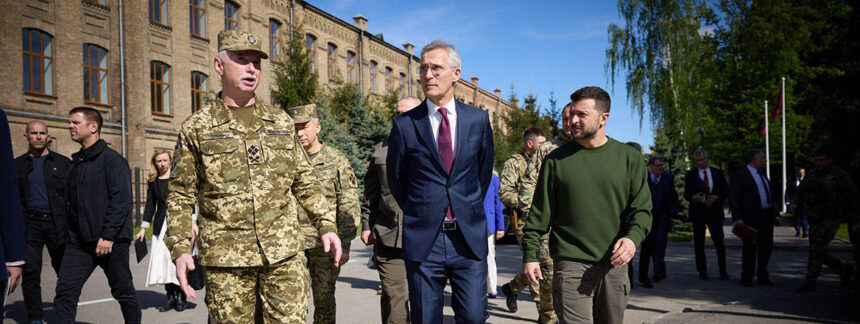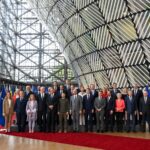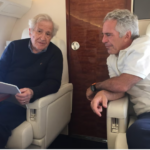Summary by Geopolist | Istanbul Center for Geopolitics:
The commentary argues that despite Russia’s current opposition, it may be in its long-term interests for Ukraine to eventually join NATO. The Russian invasion of Ukraine has led to a prolonged conflict and has diminished the possibility of Russia achieving complete control over Ukraine. A post-war Ukraine is likely to emerge as a heavily militarized state, potentially with nuclear capabilities, seeking security guarantees. By integrating Ukraine into NATO, similar to Germany’s reunification in NATO in the early 1990s, Ukraine would adopt a collective foreign policy and may not pursue independent nuclear weapons, thereby enhancing regional stability. The commentary suggests NATO should consider this path, even if Russia has yet to accept Ukraine’s NATO membership.
Ukraine in NATO is in Russia’s Interests
With this week’s NATO summit, the perennial question of Ukraine’s future membership will again be raised and left unresolved. However, Ukraine joining NATO at the conclusion of the Russo-Ukrainian War is also in Russia’s interests, although it may not yet realise or acknowledge this reality.
When Russian President Vladimir Putin invaded Ukraine in 2022, he undoubtedly envisioned a fait accompli in which rapid military success in seizing the country would have been followed by immediate threats to deter others from intervening to halt or reverse his aggression. Of course, that did not happen, and Putin has found himself in an intractable war of attrition. The Russian military, with its officer corps decimated and its best troops and equipment squandered, is no longer capable of seizing all of Ukraine, meaning that at the end of the war, some version of Ukraine is almost sure to survive and share a border with Russia.
To date, Russia has insisted on future Ukrainian neutrality and demilitarisation, but this insistence is based on the faulty assumption that Russia can simply return to pre-war paradigms if its war aims are not achieved; that is not the case. Ukraine’s limited pre-war military capabilities and nonaligned status contributed to the instability that failed to deter Russian aggression and led to war. While Ukraine might have been willing to consider a less militarised neutrality prior to the war, since 2022, Ukraine has suffered invasion, war crimes and nuclear threats from its larger neighbour. A post-war Ukraine will undoubtedly be a militarised one.
NATO should act with an understanding of what is in Russian interests, and gradually move toward NATO membership for Ukraine, even if Russia has not yet accepted this new reality “
This dilemma bears striking similarities to the logic that drove the reunification of Germany in NATO from 1989–1991. As momentum built toward German reunification, the West advocated for reunification in NATO, while the Soviet Union initially supported a neutral Germany as a buffer between NATO and the Warsaw Pact. However, a neutral Germany positioned between two alliance blocs would have to have been an armed one and, to guarantee the survival of the state, might have pursued nuclear weapons. By embedding Germany within the bureaucratic and command structures of NATO and under the NATO nuclear umbrella, Germany was obliged to pursue a collective foreign policy and had no incentive to develop nuclear weapons.
When the war is over, Russia will be left with a neighbour that will be, at a minimum, wary – if not bitter – for generations. A neutral Ukraine, bordering Russia but outside of NATO, would be forced to be an armed neutral. Ukrainian President Volodymyr Zelensky has already described a post-war Ukraine as a ‘big Israel’ in which security is a top policy concern and the country is prepared for rapid mobilisation. To guarantee its survival and deter another Russian invasion, Ukraine – which has nuclear facilities and expertise, previously hosted Soviet nuclear weapons, and has been the recipient of Russian nuclear threats – may be incentivised to develop a nuclear deterrent and aim it at Moscow. By embedding Ukraine within the bureaucratic and command structures of NATO and under the NATO nuclear umbrella, Ukraine would be obliged to pursue a collective foreign policy, and the imperative to develop an independent nuclear deterrent would be alleviated.
Russia’s most preferred outcome would have been to gain control over all of Ukraine, but that outcome seems unlikely – if not impossible – for Russia to achieve. Russia’s second most preferred outcome would be a neutral, demilitarised and reduced Ukraine, but now that Ukraine has suffered through a brutal fight for its very existence, to think that it would allow a reemergence of the same dynamics and instability that invited Russian aggression in the first place is unrealistic. That leaves a heavily armed neutral Ukraine, perhaps with nuclear weapons, and Ukraine in NATO as the remaining possibilities. Of these, it is arguably better for Russia’s security interests to border a more secure, less militarised Ukraine, constrained by a collective foreign policy, than a highly militarised, less secure and less constrained Ukraine. Thus, it may be in Russia’s long-term interests for Ukraine to join NATO.
While some argue that NATO expansion caused the war, the reality is that NATO has successfully deterred conflict with Russia for 75 years, and Russia stripping military equipment from its frontiers with NATO to fight in Ukraine exposes the lie of that claim.
Russia’s miscalculation got it into this protracted war of choice; it should not miscalculate again about what is possible after the war. Additionally, NATO should act with an understanding of what is in Russian interests, and gradually move toward NATO membership for Ukraine, even if Russia has not yet accepted this new reality.
By: Colonel Dr Nathaniel B Davis







